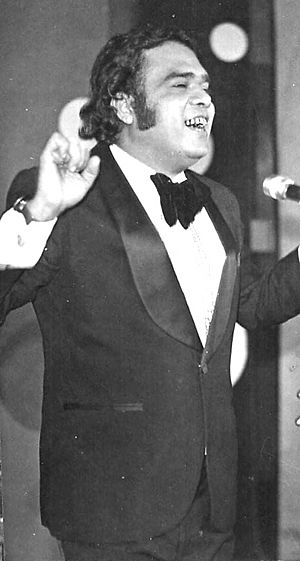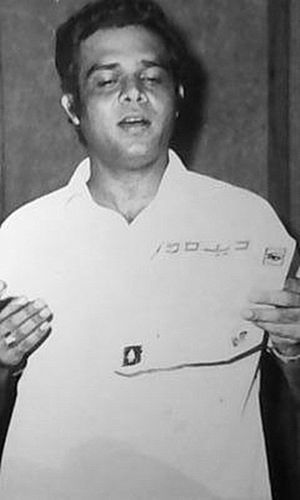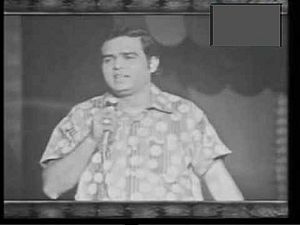Ahmed Rushdi facts for kids
Quick facts for kids
Ahmed Rushdi
|
|
|---|---|
 |
|
| Background information | |
| Birth name | Syed Ahmed Rushdi |
| Also known as | |
| Born | 24 April 1934 Hyderabad Deccan, British India |
| Origin | |
| Died | 11 April 1983 (aged 48) Karachi, Pakistan |
| Genres | |
| Occupation(s) | Urdu and regional playback singer |
| Instruments | Vocalist |
| Years active | 1951–1983 |
Ahmed Rushdi (24 April 1934 – 11 April 1983) was a very talented Pakistani playback singer. A playback singer is someone who records songs for actors to lip-sync (pretend to sing) in movies. He was known as a big part of the "golden age" of Pakistani film music.
Many people think he was one of the greatest singers in South Asia. He was famous for his amazing voice and how he could sing many different styles of music. He could even sing very high notes easily! Ahmed Rushdi is also seen as the first pop singer in South Asia. He sang the first pop song, "Ko Ko Korina", for the 1966 film Armaan.
Ahmed Rushdi was born in Hyderabad Deccan, which was part of British India. After India was divided in 1947, his family moved to Pakistan. In 1954, he helped record the official National anthem of Pakistan. He sang the most film songs in the history of Pakistani cinema. He sang in many languages like Urdu, English, Punjabi, Bengali, Sindhi, and Gujarati. He was very successful from the mid-1950s to the early 1980s. He was also great at performing live on stage.
Ahmed Rushdi recorded about 5,000 songs for 583 films. He passed away from a heart attack when he was 48 years old. Besides pop music, he also helped make ghazals (a type of poetry set to music) popular. He won many awards, including five Nigar Awards. In 2003, 20 years after he passed away, the President of Pakistan gave him the Sitara-e-Imtiaz award. This award is for great achievements in arts. His song Ko Ko Korina was even featured in the American TV series Ms. Marvel (TV series) in 2022.
Contents
Early Life and Musical Start
Ahmed Rushdi was born in 1934 in Hyderabad Deccan. His father, Syed Manzoor Mohammad, taught languages and history at a college. Sadly, his father passed away when Ahmed was only six years old.
From a young age, Ahmed loved listening to music on the radio. No one in his family was a musician, but he had a natural talent for singing. A close friend of his father noticed his singing skills. This friend helped him join a local music school in Hyderabad Deccan. There, he learned the basics of music from popular composers like M.A. Rauf and Iqbal Qureshi. Later, he also got some training in classical music from Ustad Nathu Khan.
Even though he didn't have a lot of formal training, Ahmed Rushdi was very good at singing both high and low notes. He sang his first song in an Indian film called Ibrat in 1951. This song helped him become known. In 1954, his family moved to Karachi, Pakistan. There, he started performing on the radio, including children's shows. His first non-film song, "Bunder Road se Keemari," became a big hit on Radio Pakistan. This song was a key step for his future career.
A Star's Singing Career
Becoming a Film Star: 1950s and 1960s
After his radio success, Ahmed Rushdi started getting offers to sing for films. He quickly became very popular. He sang for many hit movies like Bara Admi (1956) and Wah Rey Zamaney (1957). In 1961, he sang "Chand Sa Mukhra Gora Badan" in the film Saperan. For this song, he won his first Nigar Award for Best Male Playback Singer.
He became one of the top male playback singers. In 1966, he sang "Ko Ko Korina," which is often called the first modern Pakistani pop song. This song was for the film Armaan.
The film Anchal (1960) was also very important for his career. The music director, Khalil Ahmed, wanted Rushdi to re-record a sad song called "Kisi chaman mei raho tum." Rushdi's version was perfect. After that, Khalil Ahmed always chose Rushdi to sing for his films. Even when other great singers like Mehdi Hassan became popular in the mid-1960s, Rushdi remained a leading singer.
Music experts agreed that Rushdi's voice suited every type of actor. He sang for heroes like Waheed Murad and Nadeem. He also sang for comedians like Munawar Zarif and Lehri. His voice seemed to fit everyone perfectly.
In 1963, Rushdi sang the ghazal "Shok-e-awargi" for the film Joker. This song became very popular. He also sang "Mei Nahi Manta" in the film Khamosh Raho (1964), which made the poet Habib Jalib famous.
In 1967, Ahmed Rushdi sang four songs for actor Nadeem's first film as a main actor, Chakori. These included "Kabhi toe tum ko yaad ayen gi" and "Pyare pyare yar humare." He also sang all the songs for the films Doraha and Shehnai that same year.
In 1968, Rushdi recorded his first Bengali song, "Ke Tumi Ele Go," for a film in Dhaka. It was a huge hit in what was then East Pakistan (now Bangladesh). He also sang many other popular songs that year, like "Ae mere diwaney dil."
In 1969, he sang "Ae abr-e-kaaram aaj itna baras" for the film Naseeb Apna Apna, which won him another Nigar Award. He also sang popular duets with singers like Mala. His songs for actor Waheed Murad were especially popular. Their pairing in films like Armaan created many hits, including "Akele Na Jaana," which earned Rushdi another award.
Continuing Success: 1970s and 1980s
The 1970s brought new singers, but Ahmed Rushdi stayed a top singer in the film industry. He sang for films like Bandagi, Naag Muni, and Baazi in 1971. He won awards for songs like "Aik albeli si naar" and "Tum bhi ho ajnabi."
In 1972, he sang four solo songs and one duet for Waheed Murad in the film Khalish. He also sang for Mohammad Ali in the film Mohabbat, including the sad song "Khudara mohabbat na karna."
In 1973, he recorded a qawwali (a type of devotional music) called "Dil torney waley." He also sang romantic and sad songs for other films. Besides singing, Ahmed Rushdi also acted in thirteen films, such as Anokhi (1956) and Kaneez (1965).
In 1975, his song "Dil ko jalana hum ne chor diya" from the film Mohabbat Zindagi Hai became very popular. He also recorded many songs for Pakistan television.
Sharmeeli (1978) was his last film with actor Nadeem as a playback singer. The songs from this film were very popular. He also sang for Mohammad Ali in Apka Khadim.
The 1980s were a difficult time for the Pakistani film industry. Fewer Urdu films were made, and Punjabi films became more common. Also, the government limited music distribution on TV. Even with these changes, Rushdi's popularity remained. He continued to sing for films like Farzana and Hanstey Aansoo.
Ahmed Rushdi was also very busy singing for Radio and Television. He was a leading singer from 1954 to 1983. He sang for all the famous actors in Pakistan. His very last song was "Ban ke misra ghazal ka" in 1983 for the film Hero. This song, featuring Waheed Murad, was a big hit. He sang many duets with famous female singers like Noor Jahan, Zubaida Khanum, and Runa Laila during his 33-year career.
The "Magician of Voice"
Ahmed Rushdi was called the "Magician of Voice" because he could sing so many different types of songs. He sang happy songs, sad songs, comedy songs, qawwalis, lullabies, patriotic songs, pop songs, and folk songs. He was the first South Asian singer to really bring pop music to the region. He inspired many singers with his clear voice and emotional way of singing.
He was also unique because he could make different sounds, like bird calls, while singing. In the film Jub Jub Phool Khile, he sang a song called "Burhapey mein dill na lagana" for two actors. He sang it in both a young voice and an old voice, all in one go! This amazed music critics.
First Pop Singer of South Asia
Ahmed Rushdi is known as the first true pop singer in South Asia. He brought new music styles like hip-hop, rock n roll, and disco to the region. His success influenced music in Bangladesh, India, and Nepal. After him, Christian bands in cities like Karachi and Mumbai started playing jazz and covering his songs.
Because of Ahmed Rushdi, Pakistani music has become very popular across South Asia. Pop singers like Alamgir and Mohammed Ali Shehki followed in his footsteps.
Personal Life
Family Life
Ahmed Rushdi married Humera on November 30, 1963. His wife passed away in 1992, nine years after him. He came from a religious family and was a very private person. Even though he was famous, he never had any scandals in his career. He had three daughters. His youngest daughter, Rana Rushdi, would sing his songs for him, which made him very happy. However, he didn't want his daughters to become professional singers.
Ahmed Rushdi and Noor Jahan were the highest-paid singers of their time. But Rushdi would often sing for free for producers and music directors who couldn't afford him. He also helped new talents, like music director Lal Mohammad Iqbal and poet Masroor Anwer, get their start in the film industry.
Later Years and Passing
In the early 1980s, Ahmed Rushdi moved to Karachi to get proper heart treatment because he wasn't feeling well. He was singing less for films because the film industry was also slowing down. Many cinemas closed, and people started watching more television. Even so, music directors still wanted him to sing. He even opened a music academy to teach young people. Ahmed Rushdi's singing career never really declined; he was always in demand.
Doctors advised him to sing less in his last years, but he believed music was his life. He had a second heart attack in 1981 while working on a music album. On April 11, 1983, he had a third heart attack. He was taken to the hospital but passed away at the age of 48. He was buried in Karachi. His last non-film song was a duet called "Aaney walo suno."
After his death, actor Waheed Murad said, "Today I have lost my voice." He felt that Rushdi's voice was his own. Many friends and singers paid tribute to Rushdi after he passed away.
Popularity and Influence
Ahmed Rushdi changed film music in the Indian subcontinent. His influence was felt in the Indian and Bangladeshi film industries too. He is seen as one of the most amazing singers from South Asia. He was great at every type of singing, including ghazals and qawwalis.
Music director Nisar Bazmi once said that Ahmed Rushdi and Mohammad Rafi were special because their voices didn't get squeaky when they sang high notes. He also mentioned that a Chinese group once sang one of Rushdi's songs, showing his worldwide popularity.
Indian playback singer Kishore Kumar was a big fan of Ahmed Rushdi. He even sang one of Rushdi's songs, "Aik urran khattola aye ga kisi lal pari ko laye ga," at a concert in London. Other leading Indian singers like Sonu Nigaam, Shan, and Kumar Sanu have also honored Rushdi by singing his songs.
Actor Nadeem said that Ahmed Rushdi's amazing voice made his acting work easier. Many people compared his music to that of classically trained singers, even though Rushdi didn't have much formal training. He is known as the "Magician of Voice," and his death was a huge loss to the music industry.
Ahmed Rushdi influenced many singers, including A Nayyar, Mujeeb Aalam, and Runa Laila. He is one of those artists who remain popular and have many fans even after they are gone. In 2018, a remake of his song "Ko Ko Korina" was produced for Coke Studio Pakistan. However, many people felt the new version didn't do justice to the original classic.
Awards
Nigar Awards
- 1961 – Best Male Playback Singer for "Chand Sa Mukhra Gora Badan" in Saperan
- 1962 – Best Male Playback Singer for "Gol Gappey Wala" in Mehtaab
- 1963 – Best Male Playback Singer for "Kisi Chaman Mei Raho" in Anchal
- 1966 – Best Male Playback Singer for "Akeley Na Jana" in Armaan
- 1970 – Best Male Playback Singer for "Aey Abr-e-Karam" in Naseeb Apna Apna
- 2004 – Life Time Achievement Award
Graduate Awards
- 1965 – Best Male Playback singer for "Mohabbat Mei Tere Ser Ki Qasam" in Aisa Bhi Hota Hai
- 1967 – Best Male Playback singer for "Haan Issi Mor par" in Doraha
- 1968 – Best Male Playback singer for "Kabhi Toe Tumko Yaad Ayen Gi" in Chakori
- 1969 – Best Male Playback singer for "Kuch Log Rooth Kar Bhi" in Andaleeb
- 1970 – Best Male Playback singer for "Lag Rahi Hai Mujhey Aaj Sari Fiza" in Anjuman
Musawwir Awards
- 1972 – Best Male Playback singer for "Meri Jaan Meri Jaan Yehi Zindagi Hai" in Bandagi
- 1973 – Best Male Playback singer for "Hai Kahan Woh Kali" in Anhoni
- 1975 – Best Male Playback singer for "Mashriqi Rang Ko Chor Ke" in Mohabbat Zindagi Hai
- 1978 – Best Male Playback singer for "Tu Saamney Hai Mere" in Sharmeeli
- 1979 – Best Male Playback singer for "Sab Kamron Mein Band Hain" in Zameer
Other Awards
- 1967 – Best Sad Song Award for "Tujhey Apney Dil Se Mei Kaisey Bhuladoon" in Shehnai
- 1968 – Classic Award for "Kiya Hai Jo Pyar To Padega Nibhana" in Dil Mera Dharkan Teri
- 1970 – Silver Screen Award for "Chhor Chaley Hum Chhor Chaley" in Phir Chand Nikley Ga
- 1973 – Al-Fankar Award for "Mei Tujhey Nazar kya Doon" in Anhoni
- 1975 – Screen Light Award for "Dil Ko Jalana Hum Ne Chor Diya" in Mohabbat Zindagi Hai
- 1983 – Rooman Award for "Ban Ke Misra Ghazal Ka Chaley Aaona" in Hero
- 2000 – Best Singer Of The Millennium Award
- 2001 – Legend Award
- 2004 – Sitara-i-Imtiaz
- 2005 – Indus TV Indus Music Hall of Fame
- 2012 – Lux Style Award Lifetime Achievement Award
See Also
 In Spanish: Ahmed Rushdi para niños
In Spanish: Ahmed Rushdi para niños
- Pakistan film industry
- Playback singer
- Ghazal
- Cinema of Pakistan
- Honorific nicknames in popular music
- List of Pakistani film singers
- List of Pakistani ghazal singers
- List of Lollywood actors
Images for kids
-
Rushdi with Badar Munir, Sohail Rana and a film producer during a song composition
-
Ahmed Rushdi's grave at Sakhi Hassan cemetery, Karachi
 | James Van Der Zee |
 | Alma Thomas |
 | Ellis Wilson |
 | Margaret Taylor-Burroughs |





